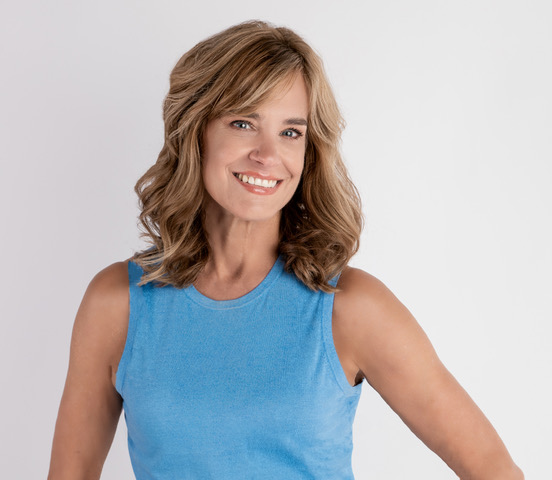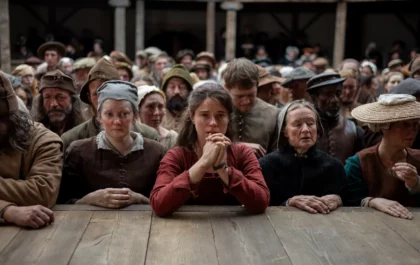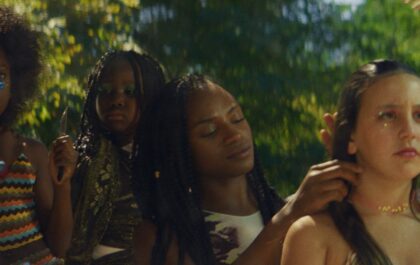Catherine Mary Stewart was met films als Night of the Comet, The Last Starfighter of Weekend At Bernie’s één van de grote supersterren uit de jaren 80. Stil zitten was er voor Catherine nooit bij. Voor Fast Forward maakte de iconische actrice wat tijd vrij om haar – toch wel indrukwekkende – carrière te overlopen.
Dag Catherine, fijn dat je tijd wilde maken voor Fast Forward. Laten we even je carrière overlopen. Op vrij jonge leeftijd verhuisde je van je thuisland Canada naar Londen om er jazzdans te gaan studeren, dus ik denk dat je al op jonge leeftijd reeds wist dat je iets in de showbusiness wilde doen. Was actrice worden je hoofddoel?
Catherine: Ik heb acteren gestudeerd op de middelbare school in Canada. De school voor podiumkunsten in Londen, Engeland, waar ik na de middelbare school naartoe ging, had ook acteer-, zang- en andere podiumkunstenlessen, maar de nadruk lag toch op dans. Op dat moment in mijn leven draaide alles om dans. Ik hield van optreden en ik probeerde mezelf te ontwikkelen in de richting van een carrière. Op dat moment wist ik echt niet hoe dat eruit zou zien. Bij toeval deed ik auditie als danseres voor de film The Apple en kreeg de vrouwelijke hoofdrol aangeboden, mijn carrière als danseres was nog in beweging, dus ik ging ervoor.
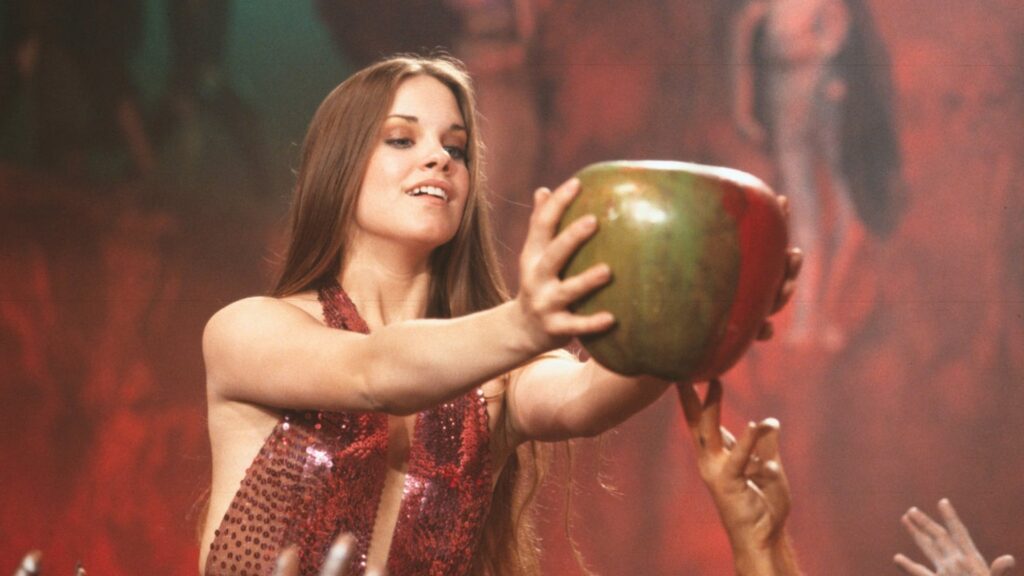
The Apple is op zijn zachtst gezegd een vreemde film. Hoe ben je aan deze rol gekomen?
Catherine: Ik kwam toevallig een paar klasgenoten tegen op weg naar mijn les in Londen. Ze hadden over deze auditie gehoord en gingen erheen. Ik besloot mee te gaan om te zien waar het over ging. Toen ik auditie deed als danser, zag Menahem Golan me en trok me uit de menigte. Hij vroeg me of ik kon acteren en ik zei “ja”. Hij vroeg me of ik kon zingen en ik zei “ja”, dus koos hij me ter plekke voor de rol. Hij had ook een andere danseres voor de rol, maar hij vond me blijkbaar goed en ik kreeg uiteindelijk de rol.
Volgens je biografie was het Menahem Golan die je geboortenaam Catherine Mary Nursall veranderde in Catherine Mary Stewart. Waarom was dat precies?
Catherine: Menahem hield niet van mijn echte naam. Hij vond het niet mooi klinken en vroeg me of ik een andere naam kon bedenken voor mijn beroep. Mijn ouders waren op dat moment toevallig in Londen en we hadden er een gesprek over. Mijn moeder’s meisjesnaam is Stewart. Ik dacht dat Catherine Mary Stewart wel leuk klonk, dus nam ik haar naam aan als een klein eerbetoon aan haar. Later heb ik mijn naam legaal veranderd om het makkelijker te maken om werk te vinden, enz.
Iedereen heeft minstens één hilarisch verhaal over Menahem Golan, vertel me het jouwe.
Catherine: Menahem was nogal een karakter hoor. Hij kon een lieverd zijn, maar ook een bullebak! Hij had een heel sterke visie op wat hij wilde en hij was een harde werker met een sterk arbeidsethos. Menahem had weinig geduld voor mensen die zijn visie of arbeidsethos niet konden waarderen. We hebben het grootste deel van de film in Berlijn opgenomen. Op een avond ging ik uit met een stel mensen uit de film omdat ik dacht dat ik de volgende dag vrij had. We bleven de hele nacht weg. Ik kwam rond 7.30 uur terug in het hotel en ik had de call-sheet voor die dag verkeerd gelezen en ik zag dat ik als eerste aan de beurt was om te filmen. We haastten ons op topsnelheid naar de studio en ik zat in de make-up toen Menahem de make-upruimte binnenkwam en tegen me begon te schreeuwen over hoe onverantwoordelijk ik was en dat hij nooit meer met me zou werken en dat ik nooit meer in deze business zou werken. Toen stormde hij weg. Ik was duidelijk geschokt en een beetje bang en gekwetst, maar dit was zo nieuw en ik nam het gewoon van dag tot dag. Ik zag mezelf nog steeds als een danser, dus ik voelde me niet teneergeslagen door zijn opmerkingen. Maar ik heb wel een waardevolle les geleerd. Een shoot tegenhouden kan extreem duur en vervelend zijn voor iedereen die erbij betrokken is. Er zijn zoveel mensen betrokken bij een productie en ze hebben er allemaal mee te maken. Ik heb dat nooit meer gedaan.
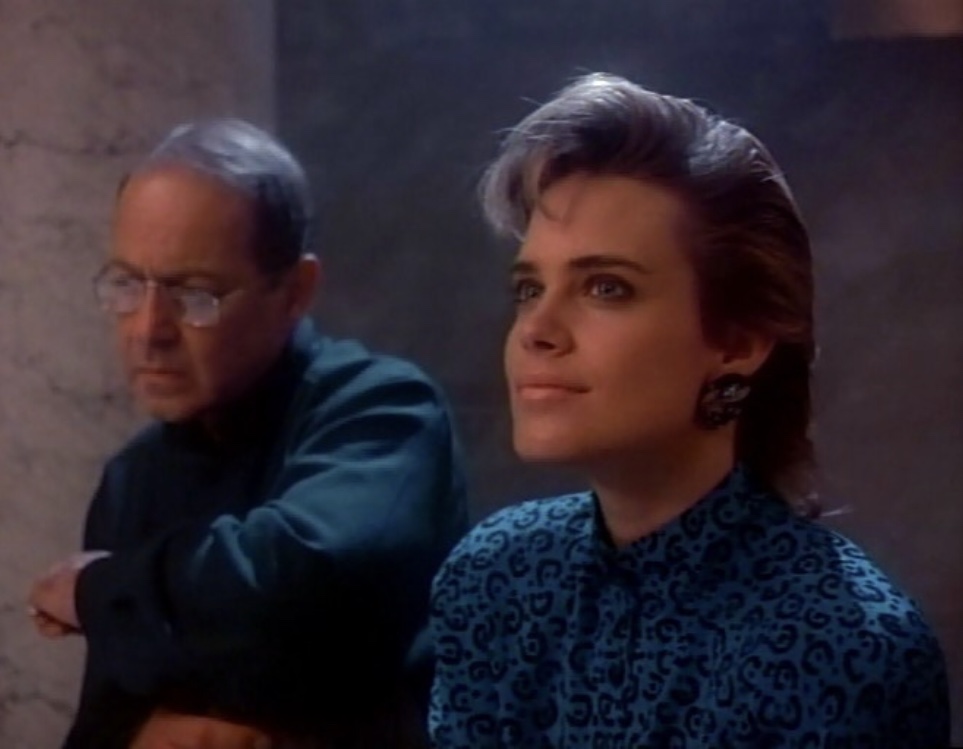
1984 was zeker jouw jaar met zowel The Last Starfighter als Night Of The Comet. Nu ik erover nadenk, lijkt het alsof je vroege rollen – zelfs The Apple – sciencefictiongerelateerd waren. Heb je daar ooit over nagedacht?
Catherine: Dat was zeker een populair genre in die tijd. Ik heb daar niet echt over nagedacht. Ik heb tussendoor veel andere dingen gedaan die geen sciencefiction waren, dus ik heb er toen zeker niet aan gedacht. The Last Starfighter en Night of the Comet hebben zeker de tand des tijds doorstaan wat betreft mijn carrière.
Sommigen zeggen dat 1984 het beste filmjaar van de jaren tachtig was, en in dat jaar werd je een grote ster. Ook al ben ik zelf wel een enorme jaren tachtig-verslaafde, vind ik eerlijk gezegd dat je films helemaal niet gedateerd lijken. Mee eens?
Catherine: Wat ik het leukste aan die films vind, is dat ze over gewone mensen in buitengewone situaties gingen. Ik denk dat het feit dat het publiek zich kan verplaatsen in de personages en de fantastische reis met hen kan meemaken, terwijl het tegelijkertijd geïnspireerd wordt door de boodschap van de film, ze tijdloos maakt.
Voor die film deed je auditie voor Death of a Centerfold: The Dorothy Stratten Story. Ik ben zelf een grote fan van Dorothy Stratten, maar de film is niets vergeleken met Star 80 van Bob Fosse. Heb je er spijt van dat je verloor van Jamie Lee Curtis voor die rol?
Catherine: In deze business is er echt geen tijd voor spijt. Ik weet nog dat ik Jamie Lee Curtis ontmoette tijdens die auditie. Ik wist wie ze was, dus toen ze me aankeek en op de aardigste manier zei: “Je zou perfect zijn voor deze rol! Je lijkt precies op Dorothy Stratten!”, was ik dolblij. Ik zal nooit vergeten hoe aardig ze was. Dat gebeurt niet vaak bij audities. Ik denk dat ik qua gezicht meer op haar leek, maar Jamie had wel het lichaam.
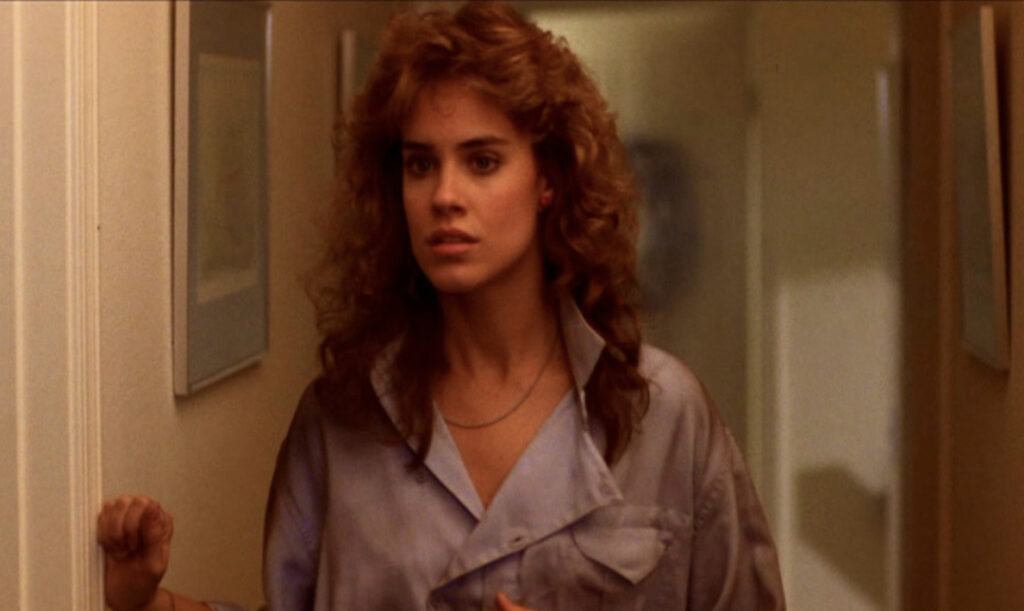
En laten we Weekend At Bernie’s niet vergeten, een van de grappigste films van de jaren tachtig. Ik denk dat je het hier alleen maar mee eens bent, kijk je zelf ook nog naar die films?
Catherine: Toen ik Weekend at Bernie’s voor het eerst las, vond ik het een nogal grof concept. Ik begreep niet echt hoe het grappig was om een lijk door een film te slepen. Wat had ik het mis. Maar ik moet zeggen, als Terry Kiser niet zo briljant had geacteerd, had het vast niet zo goed gewerkt. Hoeveel acteurs die een dode spelen kunnen acteurs die nog leven overtreffen? Niet veel. Ik ben dankbaar dat ik heb mogen meewerken aan een echte en bizar iconische film.
Veel van je films zijn onlangs gerestaureerd op gerespecteerde Blu-ray labels. Ik denk dat het voor een acteur veel betekent dat ze niet vergeten worden, toch?
Catherine: Het is ongelooflijk dat de fanbase na al die jaren nog zo sterk is. Het is sterker dan toen de films voor het eerst werden uitgebracht. Het publiek werd echt opgebouwd door de toegankelijkheid via VHS. Zoveel mensen die naar me toe komen om te vertellen dat ze mijn films keer op keer herbekijken op VHS-band. Daar groeide hun passie foor en nu willen ze dat delen met hun eigen kinderen. Het is verbazingwekkend!
Op een bepaalde manier denk ik dat je veel mensen ontmoet voor wie die oude films met nostalgie verbonden zijn. Wat vind je daarvan en wat betekent nostalgie voor jou?
Catherine: Nostalgie is een belangrijk onderdeel van de menselijke natuur. Ik zie het als een positieve reflectie van het verleden, met herinneringen aan tijden die gelukkig waren, levens veranderden, sentimenteel waren en misschien op een goede manier bijdroegen aan levenskeuzes. Nostalgie kan fundamenteel zijn en dat maakt het zo belangrijk.
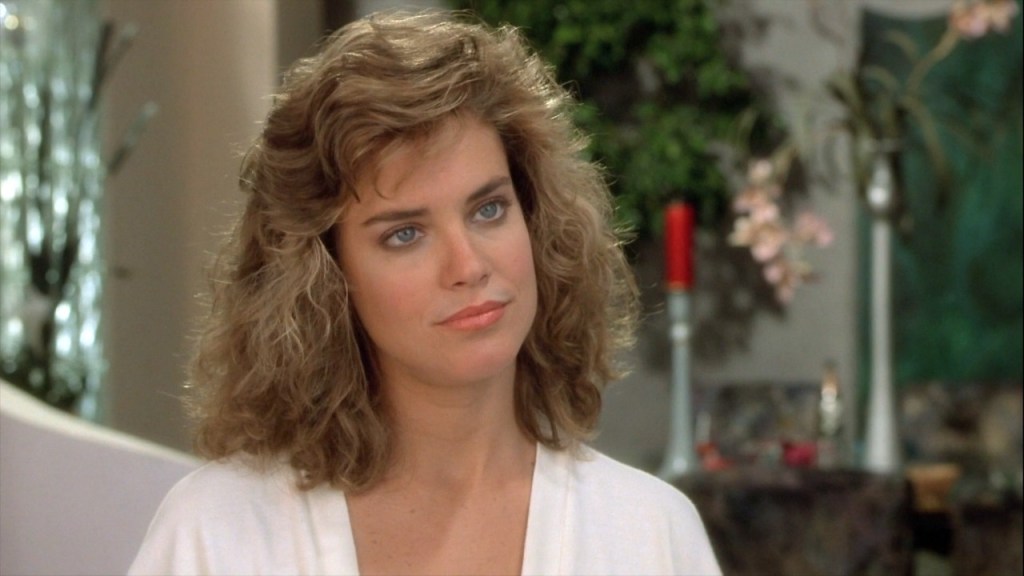
Vanaf de jaren negentig besloot je zelf om een stapje terug te zetten en je te concentreren op je gezinsleven. Ik denk dat dit geen gemakkelijke beslissing was, nietwaar?
Catherine: Ik verhuisde van LA naar New York. Het was niet mijn bedoeling om een stap terug te doen, maar ik merkte dat ik in New York niet meer in de buurt was waar ik zoveel jaren aan had gewerkt. Het was een moeilijke tijd voor mijn carrière, maar ik heb geen spijt van de opvoeding van mijn kinderen. Ze zijn buitengewone kinderen en ik zou niet trotser kunnen zijn.
Met alle respect, maar de meeste van je films uit de jaren 90 zijn minder bekend in Europa of zelfs niet verkrijgbaar. Welke daarvan vind je een must see?
Catherine: Ik ben erg trots op een film die ik heb gemaakt genaamd Mischief uit 1985, World Gone Wild uit 1987, Dudes uit 1987, de miniserie Passion and Paradise uit 1989, Cafe Romeo uit 1991 en The Sea Wolf uit 1993.
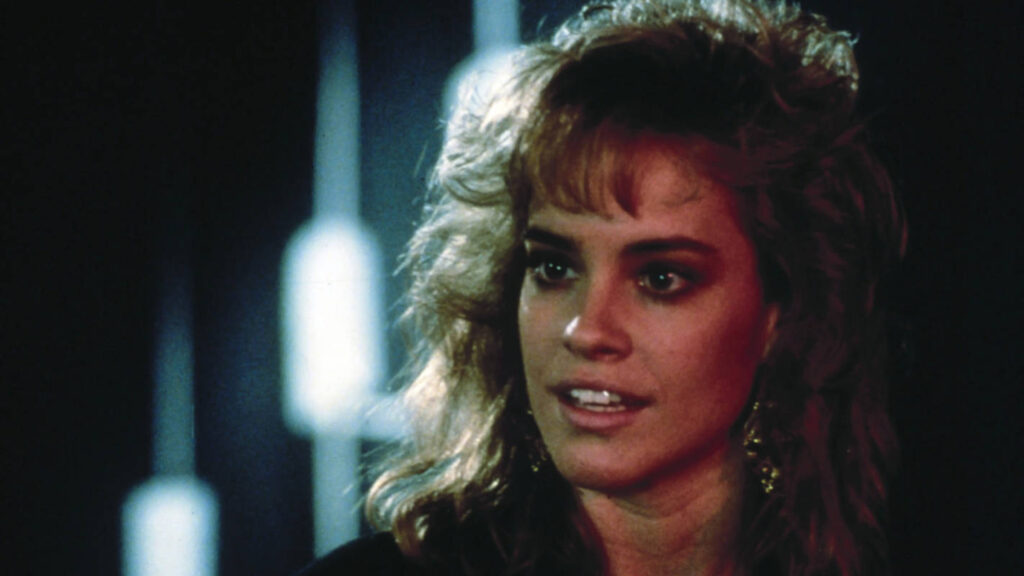
We leven in tijden van reboots. Het zou me helemaal niet verbazen mochten studio’s op een dag een reboot van The Last Starfighter of Night Of The Comet lanceren. Wat is jouw idee hierover, zie je hier potentieel in?
Catherine: Elk project waaraan ik heb gewerkt had zijn eigen uitdagingen, triomfen en vreugden. Ik hou van wat ik doe. Er wordt al een tijdje gesproken over een vervolg op The Last Starfighter. Ik vind dat een geweldig idee, vooral omdat de oorspronkelijke schrijver en regisseur Turntor erbij betrokken zijn. In het laatste voorstel kwamen de personages Alex en Maggie voor. Dat zou zo leuk zijn. Ik heb het gevoel dat de integriteit van het origineel behouden zou blijven. Ik heb ook horen praten over een remake van Night of the Comet. Voor zover ik weet zou het een complete reboot zijn. Ik ben niet zo enthousiast over dat idee. Remakes of reboots zijn volgens mij zelden succesvol. Bovendien vermoed ik dat de integriteit van het origineel verloren zou gaan aan actie en special effects, maar we zullen wel zien als het gebeurt.
Hoe dan ook, het hele filmsysteem is veranderd met de streamingplatforms. Wat is jouw mening daarover?
Catherine: Ik denk dat de acteursstaking een weerspiegeling is van hoe alles zo drastisch is veranderd. In de jaren ’80 kon je met acteren je brood verdienen. Tegenwoordig vind ik dat heel moeilijk, net als de meeste acteurs. Het publiek hoort over de “filmsterren” die tienduizenden miljoenen dollars betaald krijgen en toch zijn ze het de karakteracteurs die het verhaal dimensie geeft en een verschil kan doen maken. Ik denk dat de producenten misbruik maken van acteurs met het snel veranderende systeem en we moeten ze verantwoordelijk houden. Gewone acteurs hebben het moeilijk en geloof me, de producenten niet.
Laten we dit gesprek eindigen door te vertellen welke film jouw favoriet is (niet in welke je hebt gespeeld) en vertel ons waarom.
Catherine: Er zijn zoveel films die me op verschillende manieren raken. Ik hou van een film die me bijblijft, me inspireert, me aan het denken zet.
Ik ga er een aantal opnoemen, van de vroegste tot de laatste: On the Beach (1959), Phantom of the Opera (1962), To Sir With Love (1967), Oliver! (1968), Romeo and Juliet (1969), Sounder (1972), Jesus Christ Superstar (1973), Turning Point (1977), Fame (1980), Sophie’s Choice (1982), Local Hero (1983), Melancholia (2011) en Host (2020).
Het spijt me dat ik je er zoveel geef. En echt, dat is nog maar een begin. Elk van deze films had op verschillende manieren een diepgaand effect op mij.
ENGLISH VERSION
Catherine Mary Stewart is one of the great superstars of the 80s with films such as Night of the Comet, The Last Starfighter or Weekend At Bernie’s. Sitting still was never an option for Catherine. Even more, for Fast Forward the iconic actress took some time to discuss her impressive career.
At a quite young age you moved from your home country Canada to London to study jazz dance, so I guess you knew at an early age that you wanted to do something in the show business. Was being an actress the main goal?
Catherine: I had studied acting in junior high and high school in Canada. The performing arts school I attended in London, England, after I graduated from high school also had acting, singing and various other performing arts classes, but the focus was dance. At that point in my life it was all about dance. I loved that form of performing and I was just trying to further myself in my training moving toward a career. At that point I really didn’t know what that would look like. By chance I auditioned as a dancer for the movie The Apple and was offered the lead female acting role, my career as a dancer was still in flux, so I went for it.
Then you got the main role in The Apple which is – to say the least – a strange movie. But back then I got the idea that the producers saw it as a major movie. How did you got this part?
Catherine: I happened to run into a couple of classmates on my way to class in London. They had heard about this audition and were heading to it. I decided to tag along to see what it was all about. As I was auditioning as a dancer, Menahem Golan spotted me and pulled me out of the crowd. He asked me if I could act, and I said, “yes”. He asked me if I could sing and I said “yes”, so he had me read for the role right there and then. He had another dancer read for the role too, but it seems he liked me and I ended up with the part.
According to your biography it was Menahem Golan who turned your birth name Catherine Mary Nursall into Catherine Mary Stewart. Why exactly was that?
Catherine: Menahem didn’t like the name “Nursall”. He didn’t like the sound of it and asked me if I could think of another name to go by professionally. My parents happen to be in London at that time and we had a conversation about it. My mother’s maiden name is Stewart. I thought Catherine Mary Stewart had a nice ring to it so I adopted her name and as a little tip of the hat to her. I later changed my name legally to simplify employment, etc.
Everybody has at least one hilarious story about Menahem Golan, please tell me yours.
Catherine: Menahem was quite a character. He could be a sweetheart, but he could also be a bear! He had a very strong vision of what it was he wanted and he was a hard worker with a strong work ethic. Menahem had very little patience for those who didn’t appreciate his vision or his work ethic. We shot most of the movie in Berlin. One night I went out with a bunch of people from the movie thinking I had the next day off. We stayed out all night. I returned to the hotel around 7:30am where I was confronted by a panicked AD wondering where I had been and why I hadn’t been ready for my call time. I had misread the call-sheet for that day and I was first up to shoot. We scrambled to the studio at top speed and I was in makeup when Menhaden came into the makeup room and started screaming at me about how irresponsible I was and that he would never work with me again, and that I would never work in this business again. Then he stormed off.
I was obviously taken aback and a little frightened and hurt, but this acting thing was so new, and I really was just taking it one day at a time. I still thought of myself as a dancer, so I didn’t feel destroyed by his comments. I did learn a valuable lesson though. Holding up a shoot can be extremely expensive and aggravating for everyone involved. There are so many people involved in a production and they are all affected. I never did that again.
1984 surely was your year with both The Last Starfighter and Night Of The Comet. Now that I think about it, it seems like your early roles – even The Apple – were science fiction related. Have you ever thought about that?
Catherine: That was certainly a popular genre at the time. I haven’t really thought about that. I did lots of other things in-between that weren’t sci-fi, so I certainly didn’t think of it at the time. The Last Starfighter and Night of the Comet have definitely stood the test of time in terms of my career.
Some say 1984 is the best year of the eighties movie wise, and you became a huge star. Now even if I’m a huge eighties addict, I honestly think your movies don’t seem dated at all. Agree?
Catherine: What I like the most about those movies is that they were about ordinary people in extraordinary situations. I think the fact that the audience can relate to the characters and live the fantastical journey with them all the while being inspired by the message of the movie is what makes them timeless.
Before those film you auditioned Death of a Centerfold: The Dorothy Stratten Story. I myself am a huge fan of Dorothy Stratten, but the movie is nothing in comparison with Bob Fosse’s Star 80. Do you regret it you lost against Jaimie Lee Curtis for that role?
Catherine: In this business there really is no time for regret. I remember meeting Jamie Lee Curtis at that audition. I knew who she was so when she looked at me and said in the nicest way, “You would be perfect for this role! You look just like Dorothy Stratten!”, I was thrilled. I will never forget that and how kind she was. That doesn’t happen a lot at auditions. I think I probably did look more like her facially, but Jamie had the body.
And let’s not forget Weekend At Bernie’s, one of the most funniest movies of the eighties. I guess you’re only agreeing on this, and do you rewatch yourself those movies?
Catherine: When I first read Weekend at Bernie’s I thought it was kind of a gross concept. I didn’t really get how dragging a dead body around throughout a movie was that funny. Boy was I wrong. But I have to say, if it wasn’t for Terry Kiser’s brilliant acting, I’m not sure it would’ve worked as well. How many actors playing dead can upstage actors who are alive? Not many. I’m grateful to have been involved in a truly and weirdly iconic movie.
Many of your movies were recently restored on well respected Blu-ray labels. I guess for an actor it means a lot that they’re not forgotten, not?
Catherine: It’s incredible that after all these years the fan base is as strong as it is. It’s stronger than when the movies were first released. The audience was really built through accessibility of VHS. So many people who come up to me share stories of watching my movies over and over again on VHS tape. That’s where their passion grew and now they like to share them with their own kids. It’s amazing!!
In a way I suppose you meet a lot of people – even I’m doing this right now – for whom those old movies are related with nostalgia. What do you think of that and what does nostalgia means to you?
Catherine: Nostalgia is an important part of human nature. I think of it as being a positive reflection of the past where there are memories of times that were happy, life changing, sentimental, and maybe contributed in a good way to life choices. Nostalgia can be foundational, and that’s what makes it so important.
From the nineties on, you decided yourself to take a step back and put most on your efforts to your family life. I guess this wasn’t an easy thing to decide, not?
Catherine: I moved from LA to New York. It wasn’t my intention to take a step back, but I found that in New York I was out of the loop that I had spent so many years building. It was a difficult time in terms of my career but I don’t regret raising my children. They are exceptional adults and I couldn’t be prouder.
With all due respect, most of your movies from the 90’s on are less known in Europe or even not available. Which of them do you consider as a must see?
Catherine: I’m very proud of a movie I did called Mischief, 1985; World Gone Wild, 1987; Dudes, 1987; a mini series called Passion and Paradise in 1989; Cafe Romeo, 1991; The Sea Wolf, 1993.
We’re living in times of reboots. It wouldn’t surprise me at all if one day studios will launch the reboot of The Last Starfighter or Night Of The Comet. What’s your idea on this, do you see any potential in this?
Catherine: Every project that I’ve worked on has had its own challenges, triumphs, and joys. I love what I do. There has been talk for sometime of doing a sequel to The Last Starfighter. I love that idea especially because the original writer and direc- “Turntor are involved. The last proposal had the characters of Alex and Maggie in it. That would be so much fun. I feel like the integrity of the original would be maintained. I’ve also heard talk of a remake of Night of the Comet. From what I know it would be a complete reboot. I’m not as thrilled with that idea. Remakes or reboots are rarely successful in my mind. Plus I suspect the integrity of the original would be lost in action and special effects, but I guess if it happens we’ll see.
Anyway, the whole movie system changed with the streaming platforms. What’s your opinion on that?
Catherine: I think the actors strike is a real reflection of how everything has changed so dramatically. Back in the ‘80s you could make a living acting. I find that very difficult today as most actors do. The public hears about the “movie stars” who are being paid 10s of millions of dollars and yet they’re co-lead or the character actor in the story that gives the narrative dimension may make scale. That is not sustainable. I believe the producers are taking advantage of actors with the rapidly changing system and we need to hold them accountable. Regular actors are struggling and believe me, producers are not.
Well let’s end this conversation with making us happy by telling which movie is your favorite of all (not in which you played) and tell us why.
Catherine: There are so many movies that touch me in different ways. I love a movie that stays with me, inspires me, makes me think. I’m going to list a bunch from earliest to latest: On the Beach (1959), Phantom of the Opera (1962), To Sir With Love (1967), Oliver! (1968), Romeo and Juliet (1969), Sounder (1972), Jesus Christ Superstar (1973), Turning Point (1977), Fame (1980), Sophie’s Choice (1982), Local Hero (1983), Melancholia (2011) and Host (2020).
I’m sorry to give you so many. And really, that’s just a start. Each of these movies had a profound effect on me in different ways.



